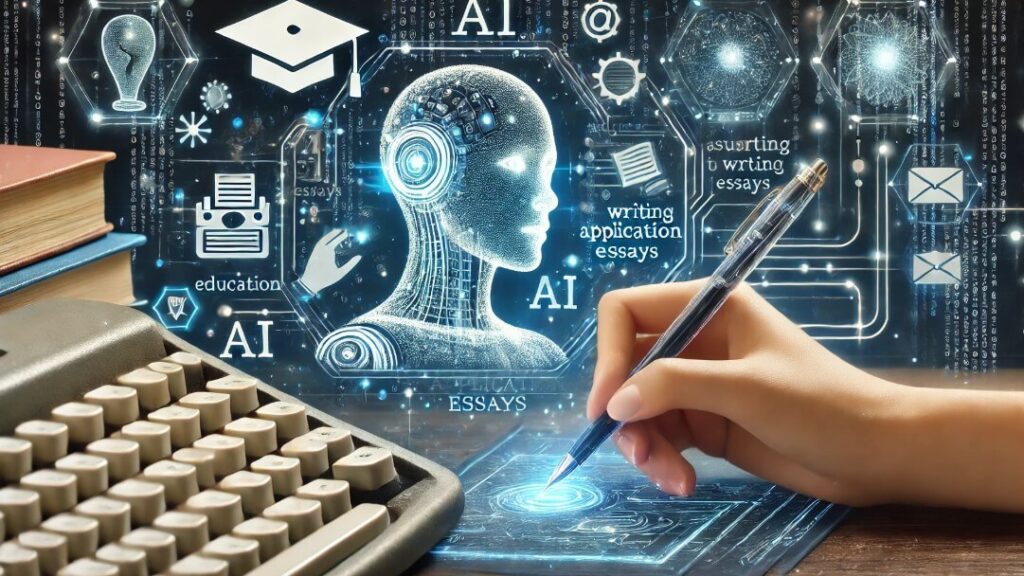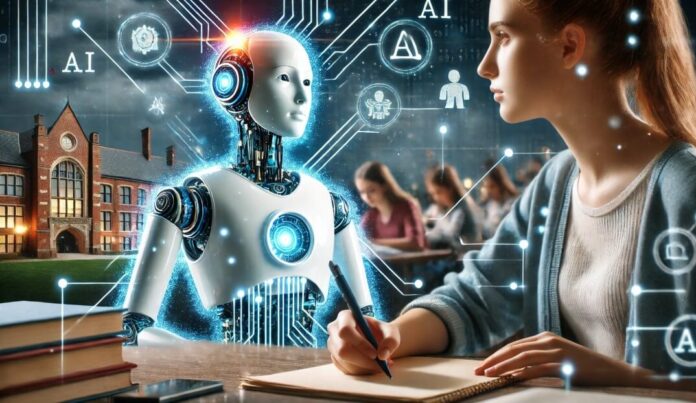Introduction
Sparked through one’s imagination, comes the never-ending question of whether AI will eventually be sophisticated enough to write academically good application essays. In an era where we are surrounded by revolving AI, this question stands for all. Indeed, it is arguable that the world is rapidly advancing within in ML and NLP, which means, more tools like ChatGPT and Jasper will keep making their way into the human-like written world. Although as intelligent as this sounds, the thought of AI generated content pertaining to application essays raises several considerations that are incredibly important.
What Makes a Good Application Essay?

Essay writing is an art and one good application essay shows the versatility of the writer. It also goes beyond just grammatical perfection. Alongside getting the structure right, the writing must reflect the applicant’s:
- Authenticity and personal voice.
- Clear motivation and goals.
- Depth of thought and originality.
- Connection to the values or mission of the institution.
These qualities require introspection and a level of emotional resonance that AI often struggles to replicate fully.
Current State of AI in Writing Application Essays
Capabilities
AI tools have already made significant progress in writing assistance:
- Natural Language Generation: Natural Language Generation: Essays that AI generates are articulate, organized, and neater than literally anything you have seen. And yes, there are no grammatical issues.
- Customization: Advanced AI can adapt to specific prompts and user-provided writing styles.
- Speed and Efficiency: AI drafts essays in seconds, making it an excellent brainstorming tool.
Limitations
Despite these capabilities, AI faces challenges:
- Lack of Personalization: AI lacks the personal experiences and emotions needed to create deeply meaningful essays.
- Generic Outputs: While grammatically sound, AI-generated essays may lack originality and depth.
- Ethical Concerns: Over-reliance on AI raises ethical questions about authenticity and academic integrity.
How AI Can Support the Writing Process
Brainstorming Ideas
AI is able to generate compelling ideas from prompts given by the user. For instance, by feeding in some snippets of experiences or achievements, AI will yield multiple starting points for one essay.
Editing and Proofreading
AI does wonders when it comes to locating punctuation and grammar errors, proposing synonyms or even modifying the sentence structure. This is done by tools such as Grammarly and ProWritingAid – which are widely used.
Structuring Essays
AI is able to aid in segregating the content into introductory paragraphs, body paragraphs, and even conclusions. This is especially helpful for applicants that have trouble outlining their thoughts.
Enhancing Vocabulary and Style
AI tools can suggest alternative words or phrases that can better captivate the audience, but let us maintain balance in polish and authenticity.
Ethical Considerations in Using AI for Application Essays
As AI becomes more advanced, ethical questions arise:
- Is it fair to use AI in application processes?
- Does AI compromise the authenticity of the essay?
- How much AI assistance is too much?
These concerns highlight the importance of transparency and personal effort in crafting application essays. Over-reliance on AI could lead to applications that feel inauthentic or lack a genuine connection to the applicant.
How Advanced Will AI Become?
AI’s future capabilities are difficult to predict, but advancements in fields like GPT and Transformer models suggest significant improvements in:
- Understanding user intent.
- Generating content that mimics personal voice and tone.
- Learning from minimal input to create highly tailored essays.
While AI might never replace the authenticity of human experiences, it will likely become a more powerful tool for enhancing the writing process.
The Human Touch: Why It Matters
The deepest application essays written are the ones that someone has to overcome something. AI can attempt to add emotional language, but it would never be able to make an essay a touching one as a human would.
Comparisons: AI vs. Human Writing
| Aspect | AI | Human |
|---|---|---|
| Authenticity | Mimics emotions but lacks real experiences. | Based on genuine emotions and lived experiences. |
| Creativity | Generates ideas within programmed limits. | Brings unique perspectives and original ideas. |
| Efficiency | Produces content quickly. | Requires more time but ensures personal effort. |
| Ethical Concerns | Risk of over-reliance and plagiarism. | Fully authentic and reflects individual effort. |
FAQs
1. Can AI replace human effort in writing application essays?
AI can support the process but cannot fully replace the authenticity and personal touch required in application essays.
2. What are the risks of using AI in writing application essays?
Over dependence on AI could lead to inauthentic, uninspired, and quite frankly boring essays.
3. How can AI be used ethically in the essay-writing process?
Use AI as a tool for brainstorming, editing, and structuring, but ensure the core content reflects your personal experiences.
4. Will colleges accept essays written with AI assistance?
While colleges may not explicitly prohibit AI assistance, they value authenticity and effort, which may be compromised if overused.
5. How advanced will AI become in writing essays?
AI will likely improve in personalization and emotional resonance but may never fully replicate human authenticity.
Conclusion
The question about the possibility of AI writing impressive application essays reduces on how we define ‘good.’ Although AI can do well in grammar, essay structure, and even in crafting emotional language, the fundamental components of a good essay are authenticity, originality, and a human touch. Rather than relying on AI and other similar tools as a means of reproduction, applicants should put them to use further complementing their purposes.
This balanced approach ensures that AI handles the foundational work, while people dedicated to writing collaborate hand-in-hand to produce meaningful and insightful essays.


